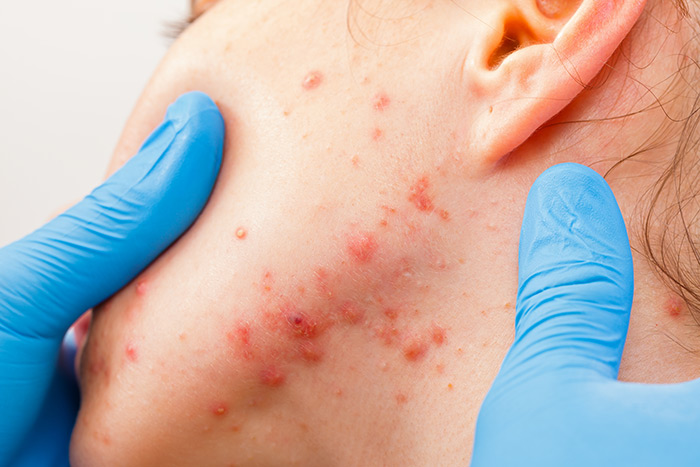Acne
What is Acne
Acne (acne vulgaris, common acne) is not just a problem for teenagers; it can affect people from all ages, and is the overall single most common reason for a visit to the dermatologist. Acne occurs when tiny holes on the surface of the skin, called pores, become clogged. Each pore is an opening to a canal called a follicle, which contains a hair and an oil gland. Normally, the oil glands help keep the skin lubricated and help remove old skin cells. When glands produce too much oil, the pores can become blocked, accumulating dirt, debris, and bacteria.

What Causes Acne?
No one factor causes acne. Acne happens when oil (sebaceous) glands come to life around puberty, stimulated by male hormones from the adrenal glands of both boys and girls. Acne tends to run in families and can be triggered by:
- Hormonal changes related to menstrual periods, pregnancy, birth control pills, or stress
- Greasy or oily cosmetic and hair products
- Certain drugs (such as steroids, testosterone, estrogen, and phenytoin)
- High levels of humidity and sweating

Where Does Acne Occur?
Usually, acne is most visible on the face. Some people call it blackheads, blemishes, whiteheads, pimples, or zits. When you have just a few red spots, or pimples, you have a mild form of acne. However, these may also arise on the neck, shoulders, back, or chest. Severe acne can mean hundreds of pimples that can cover the face, neck, chest, and back. Or it can be bigger, solid, red lumps that are painful, considered cystic acne.
When Should You Start Acne Treatment?
Since everyone gets acne at some time, the right time to treat it is when it bothers you. This can be when severe acne flares suddenly, mild acne that just won’t go away, or even when a single pimple decides to show up the week before your prom or wedding.
